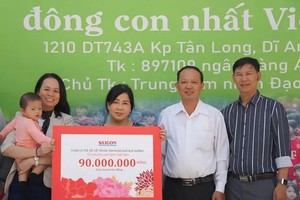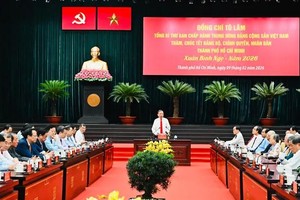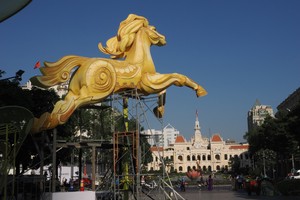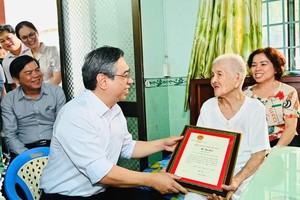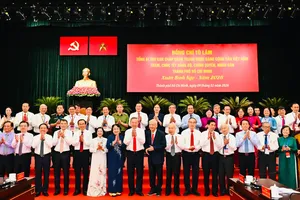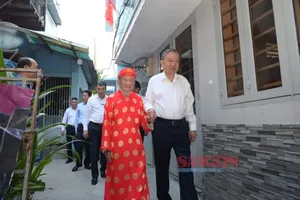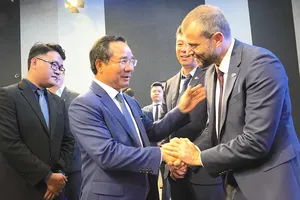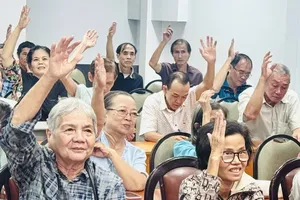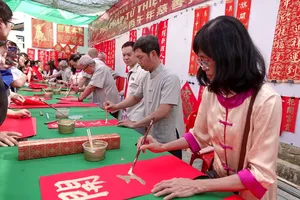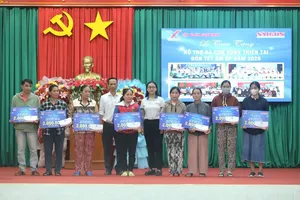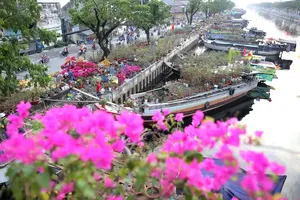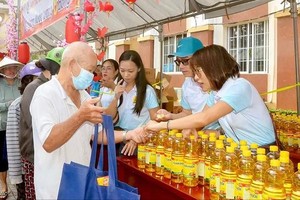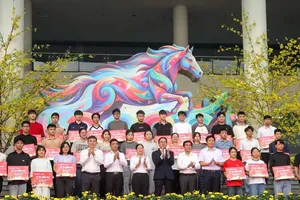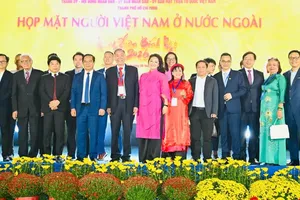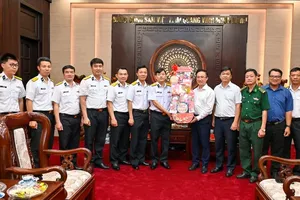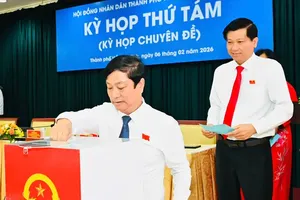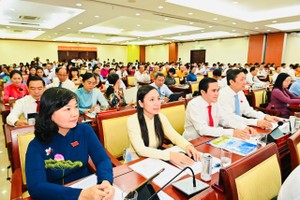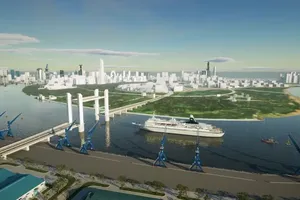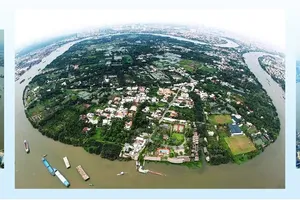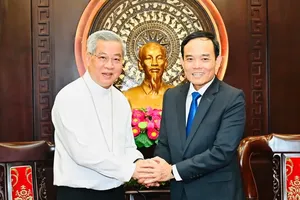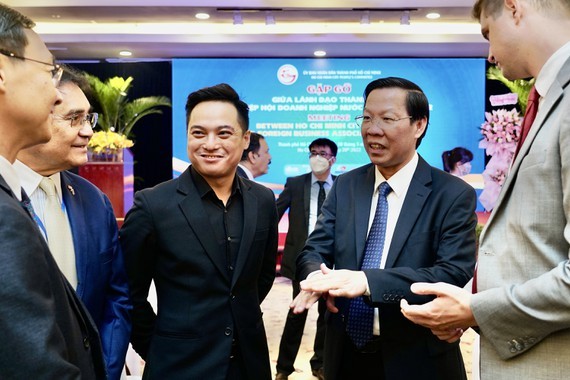 Mr. Phan Van Mai, Chairman of the People's Committee of HCMC, discusses with delegates at the meeting. (Photo: SGGP)
Mr. Phan Van Mai, Chairman of the People's Committee of HCMC, discusses with delegates at the meeting. (Photo: SGGP)
The People's Committee of HCMC, on the afternoon of May 20, organized the program "Meeting between HCMC leaders and the Foreign Business Association in 2022", with the attendance of Mr. Phan Van Mai, Member of the Party Central Committee, Standing Deputy Secretary of the HCMC Party Committee, Chairman of the People's Committee of HCMC and the foreign business community in the city.
Promoting sustainable growth
In the opening remarks, Ms. Mary Tarnowka, Managing Director of the American Chamber of Commerce (AmCham), highly appreciated Vietnam's commitment to a safe coexistence with Covid-19 and the recent reopening of international tourism activities. The key is that Vietnam, in general, and HCMC in particular, needs to ensure a positive regulatory environment.
AmCham pays attention to creating a fair, transparent, predictable, and efficient regulatory system and appreciating innovation. That means reforming administrative procedures, simplifying regulations, applying more e-approval processes, and being stable and consistent in master plans; ensuring smooth investment license renewal and investment expansion approval to be able to retain and attract investment in an increasingly competitive global environment, said Ms. Mary Tarnowka.
According to AmCham's assessment, currently, Vietnam, especially HCMC and the Southern key economic region, is attractive for investment in the high-value manufacturing sector due to its geographical location close to the source market and the consumer market; the integration into the global economy through a network of free trade agreements, a stable political system, and a young and tech-savvy workforce. Therefore, the upgrading and construction of infrastructures, such as Tan Son Nhat and Long Thanh airports, ports, waterways, as well as public transport, and many safer places for bicycles, electric vehicles, or pedestrians to support sustainable growth is an important element of HCMC.
Besides, it is essential to build digital infrastructure, in the form of a comprehensive management environment that allows for continuous cross-border data transfer and cybersecurity, which will help Vietnam exploit the full potential of its economy, creating a favorable environment for the growing entrepreneurial and innovative business community of HCMC.
Regarding infrastructure development, regional connectivity, and traffic congestion reduction, Mr. Jean Jacques Bouflet, Vice President of the European Chamber of Commerce (EuroCham), suggested that electric vehicles would be a suitable solution. He proposed to complete the socio-economic development planning for HCMC from now to 2060 and arrange public spaces to place fast-charging stations for electric vehicles to ensure environmental friendliness. The city should provide electric vehicle users with specific benefits, such as reserved parking at VIP locations, open access to the city center, and free toll gates. At the same time, there should be clear regulations and guidelines to encourage logistics companies and retailers to implement," said Mr. Jean Jacques Bouflet.
Accelerating digital transformation
At the meeting, Mr. Shon Young Il, Chairman of the Korean Chamber of Commerce and Industry (KoCham), assessed that HCMC would have a drastic change in transport infrastructure, starting from the opening of the Metro Line No.1. However, the speed of completing the logistics system in HCMC and the South remains sluggish. Therefore, HCMC needs to pay more attention to upgrading logistics infrastructure to a higher level, for example, operating a flexible traffic system through an artificial intelligence control system instead of a unified traffic system, expanding inter-regional highways, and facilitating goods circulation for businesses.
“Faced with the problem of having the necessary capital to maximize its growth potential, HCMC needs to consult with the central government to discuss expanding the urban infrastructure development budget and promoting investment,” suggested Mr. Shon Young Il.
Regarding the problem of digital transformation in handling administrative procedures, Mr. Jean Jacques Bouflet said that some stages still take a long time, increasing the risk of losing documents. For example, the public service portal of the HCMC Department of Health has not been used effectively. In contrast, some health departments in other provinces have carried out many procedures completely online.
EuroCham also recommended that all departments of HCMC, including the Department of Industry and Trade, consider the use of digital signatures for all administrative documents and procedures. Because reality shows that not all processes are allowed to use digital signatures. Meanwhile, this signature has the same legal value in signing documents related to import and export customs documents.
“We propose all departments consider and apply if there are no conflicts and constraints,” said Mr. Jean Jacques Bouflet.
Speaking at the meeting, Mr. Phan Van Mai, Chairman of the People's Committee of HCMC, thanked and appreciated the great contribution of the foreign business community.
Mr. Phan Van Mai said that he highly appreciates the advice of the associations sent directly to the municipal People's Committee, as well as at the meeting, and would record, listen, and study them to come up with the best plans and solutions to promote the development of HCMC further.
The prominent issue is that Ho Chi Minh City must take more actions to improve the business and investment environment, reform and shorten administrative procedures, and accelerate the digital transformation to create more convenience and transparency.
“During the implementation, HCMC will cooperate with associations on digital transformation to achieve better results. As for issues of culture, society, and urban organization, HCMC is truly interested. The city does not have much experience and wants to listen to more suggestions from associations from developed countries, helping HCMC to have an orientation. The city leaders want to make HCMC become not only a place with strong economic development but also a cultural and social center where people have a good quality of life and where investors want to come to invest, do business, and develop," Mr. Phan Van Mai emphasized.
Promoting sustainable growth
In the opening remarks, Ms. Mary Tarnowka, Managing Director of the American Chamber of Commerce (AmCham), highly appreciated Vietnam's commitment to a safe coexistence with Covid-19 and the recent reopening of international tourism activities. The key is that Vietnam, in general, and HCMC in particular, needs to ensure a positive regulatory environment.
AmCham pays attention to creating a fair, transparent, predictable, and efficient regulatory system and appreciating innovation. That means reforming administrative procedures, simplifying regulations, applying more e-approval processes, and being stable and consistent in master plans; ensuring smooth investment license renewal and investment expansion approval to be able to retain and attract investment in an increasingly competitive global environment, said Ms. Mary Tarnowka.
According to AmCham's assessment, currently, Vietnam, especially HCMC and the Southern key economic region, is attractive for investment in the high-value manufacturing sector due to its geographical location close to the source market and the consumer market; the integration into the global economy through a network of free trade agreements, a stable political system, and a young and tech-savvy workforce. Therefore, the upgrading and construction of infrastructures, such as Tan Son Nhat and Long Thanh airports, ports, waterways, as well as public transport, and many safer places for bicycles, electric vehicles, or pedestrians to support sustainable growth is an important element of HCMC.
Besides, it is essential to build digital infrastructure, in the form of a comprehensive management environment that allows for continuous cross-border data transfer and cybersecurity, which will help Vietnam exploit the full potential of its economy, creating a favorable environment for the growing entrepreneurial and innovative business community of HCMC.
Regarding infrastructure development, regional connectivity, and traffic congestion reduction, Mr. Jean Jacques Bouflet, Vice President of the European Chamber of Commerce (EuroCham), suggested that electric vehicles would be a suitable solution. He proposed to complete the socio-economic development planning for HCMC from now to 2060 and arrange public spaces to place fast-charging stations for electric vehicles to ensure environmental friendliness. The city should provide electric vehicle users with specific benefits, such as reserved parking at VIP locations, open access to the city center, and free toll gates. At the same time, there should be clear regulations and guidelines to encourage logistics companies and retailers to implement," said Mr. Jean Jacques Bouflet.
Accelerating digital transformation
At the meeting, Mr. Shon Young Il, Chairman of the Korean Chamber of Commerce and Industry (KoCham), assessed that HCMC would have a drastic change in transport infrastructure, starting from the opening of the Metro Line No.1. However, the speed of completing the logistics system in HCMC and the South remains sluggish. Therefore, HCMC needs to pay more attention to upgrading logistics infrastructure to a higher level, for example, operating a flexible traffic system through an artificial intelligence control system instead of a unified traffic system, expanding inter-regional highways, and facilitating goods circulation for businesses.
“Faced with the problem of having the necessary capital to maximize its growth potential, HCMC needs to consult with the central government to discuss expanding the urban infrastructure development budget and promoting investment,” suggested Mr. Shon Young Il.
Regarding the problem of digital transformation in handling administrative procedures, Mr. Jean Jacques Bouflet said that some stages still take a long time, increasing the risk of losing documents. For example, the public service portal of the HCMC Department of Health has not been used effectively. In contrast, some health departments in other provinces have carried out many procedures completely online.
EuroCham also recommended that all departments of HCMC, including the Department of Industry and Trade, consider the use of digital signatures for all administrative documents and procedures. Because reality shows that not all processes are allowed to use digital signatures. Meanwhile, this signature has the same legal value in signing documents related to import and export customs documents.
“We propose all departments consider and apply if there are no conflicts and constraints,” said Mr. Jean Jacques Bouflet.
Speaking at the meeting, Mr. Phan Van Mai, Chairman of the People's Committee of HCMC, thanked and appreciated the great contribution of the foreign business community.
Mr. Phan Van Mai said that he highly appreciates the advice of the associations sent directly to the municipal People's Committee, as well as at the meeting, and would record, listen, and study them to come up with the best plans and solutions to promote the development of HCMC further.
The prominent issue is that Ho Chi Minh City must take more actions to improve the business and investment environment, reform and shorten administrative procedures, and accelerate the digital transformation to create more convenience and transparency.
“During the implementation, HCMC will cooperate with associations on digital transformation to achieve better results. As for issues of culture, society, and urban organization, HCMC is truly interested. The city does not have much experience and wants to listen to more suggestions from associations from developed countries, helping HCMC to have an orientation. The city leaders want to make HCMC become not only a place with strong economic development but also a cultural and social center where people have a good quality of life and where investors want to come to invest, do business, and develop," Mr. Phan Van Mai emphasized.
